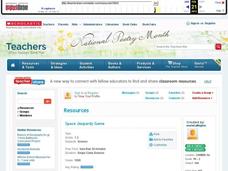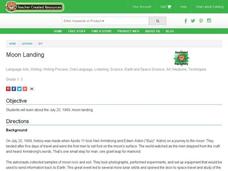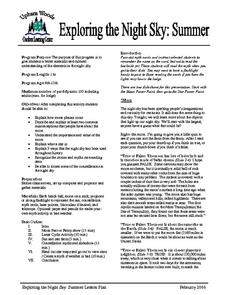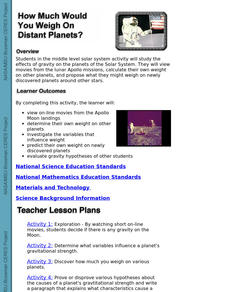Curated OER
Return to the Moon
Students react to statements about space exploration, then read a news article about plans to resume manned flights to the moon. In this space science and current events lesson, the teacher introduces the article with a discussion and...
Curated OER
The Sun, Moon, and Our Solar System: Teacher/Student Notes
Introduce basic Earth and space science to your budding astronauts. This handout works in two ways, the first part provides information about the sun, moon, eclipses, and Earth to be read to or by the class. The second part is composed...
Curated OER
once and future MOON
Beyond the phases of the moon, this comprehensive lesson plan covers geologic history and geology. Amateur astronauts examine photos of the lunar landscape, experiment with the creation of craters, and delve into information about the...
K5 Learning
The Moon
Second graders read a short informational text passage about the moon and answer a series of questions based on what they read.
Curated OER
Doin' The Moonwalk
If you are looking for an outstanding lesson on the Moon for your budding astronomers, look no further! This outstanding plan is full of wonderful, meaningful activities for your charges to engage in. Pupils will discover why there are...
Journey Through the Universe
Going through a Phase
Ignore the full moon, it's just a phase. Young scholars observe and record the moon during a full cycle before learning to predict future phases. Then the instructor leads a discussion on the other solar system objects that...
Curated OER
An Exploration on the Moon
In this Google Earth worksheet, students search the site and answer short answer questions about the moon. Students answer 18 questions.
Curated OER
Magic Tree House: Midnight on the Moon
Take your class to the moon with Midnight on the Moon! Then provide them with this short packet to develop vocabulary and practice reading comprehension. The first page has readers match vocabulary terms to their correct...
Curated OER
Apollo Moon Landing
Students explore paper rockets, learn about the Apollo Program and Apollo spin-offs, and use simple office supplies to design and create a new useful product. This amazing plan is incredibly well written and leads students through a...
Curated OER
Space Jeopardy Game
Students explore space. In this space lesson, students analyze the sky and what causes its changes. Students describe the moon patterns and use a model to show changes in its shape. Students also describe the first trip to the moon....
Curated OER
Team Moon
Students read "Team Moon: How 400,000 People Landed Apollo 11 on the Moon," by Catherine Thimmesh. They watch portions of the movie "Apollo 13." Students use the internet and the attached study guide to discover specific information...
Curated OER
Spuds in Space
Students explore the effects of velocity on an object when it collides with another object. They design and outfit a potato astronaut in a spacesuit to withstand the hazards of high velocity impacts from space debris and meteoroids.
Curated OER
Space Exploration
Sixth graders investigate the historical even surrounding the Apollo Mission to the Moon. They conduct research specifically to find information about the astronauts on the mission. The students conduct class discussion about the...
Curated OER
Moon Landing
Students research about the July 20, 1969, moon landing. They demonstrate their knowledge of the first moon landing by creating peek-a-boo rocket books. Also they can make their own moon rocks with an easy-to-make dough.
Mr. E. Science
Manned Spaced Exploration: From Start to Gemini
Seven percent of Americans believe the moon landing was staged. The presentation covers manned space exploration from the beginning of the space race through the Gemini missions. The lesson is the 23rd in a set of 26.
Curated OER
Exploring the Night Sky: Summer
Learners explain how moon phases occur. They describe and explain at least two common misconceptions that people have about the moon. Students explain what a star is. They explain 3 ways that the night sky has been used throughout history.
Curated OER
How Much Would You Weigh On Distant Planets?
Students study the effects of gravity on the planets of the Solar System. They view movies from the lunar Apollo missions, calculate their own weight on other planets, and propose what they might weigh on newly discovered planets around...
Curated OER
Moons
Students practice rote counting to 20. After a lecture about the planets and the moons that surround them, they identify the number of moons surrounding various planets. Students compare and contrast the quantity of moons surrounding...
McGraw Hill
Metric Units of Weight and Volume
Getting the right measurements can save a lot of time and money in the real world. Learners are introduced to unit conversion and how to accurately go from one unit to another. The first pages are notes and then the packet finishes with...
Curated OER
Exploring the Night Sky: Fall/Winter
Students explain how moon phases occur. They explain three ways that the night sky has been used through history. Students locate some of the constellations in the night sky. They discuss stories and myths surrounding stars.
Curated OER
Women In Space: Sally Ride
Second graders explore the life and accomplishments of Sally Ride, the first American woman in space. Through reading and discussion, they recall details from Sally Ride's life.
Curated OER
Discovering Saturn, The Real "Lord of the Rings"
Reading, writing, and rings! A lesson plan from NASA combines space science with authentic reading and writing tasks. Included in this lesson plan are pre-reading activities, four mini informational booklets on Saturn, a...
Curated OER
From the Moon to the Sun and Back Again
Students consider the aims of the space program, create posters comparing the voyages of Apollo 17 and Genesis and write response papers evaluating NASA's current mission statement.
Florida International University
The Good, the Bad and the Nasty Tasting
Examine the benefits of chemical defense mechanisms. Organisms in oceans use chemicals to ward off predators. Duplicate this adaptation using a hands-on experiment in which you ward off your predators (your pupils) with some...























